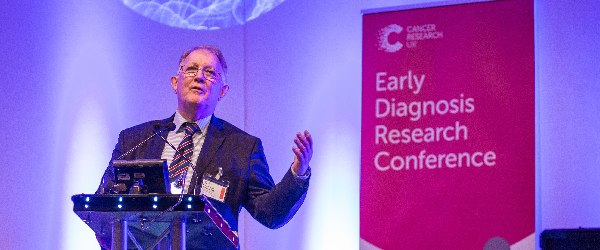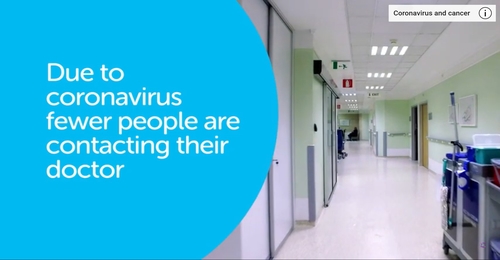| Dear Supporter, Welcome to the June 2020 Early Diagnosis newsletter. Things have changed a lot in the past few months, but we want to reassure you that we are still here, driving conversations about cancer and ensuring that the screening and early diagnosis agenda can continue to move forward. This months newsletter includes some information on what weve been doing in response to COVID-19 and its impact, as well as a few other updates. We have a lot planned for the year ahead though admittedly, not entirely what we thought wed be doing at the beginning of 2020 and we cant wait to keep you updated in a few months time. Stay safe, and thank you for reading. Best wishes, Dr Jodie Moffat and the Early Diagnosis team Cancer Research UK |
|
|---|
|
|---|
|
|
Primary Care Network Hub for health professionals 2020-21 was intended to be a key year for primary care engagement for the early diagnosis agenda in England, with the QOF QI module and the Primary Care Network (PCN) specification coming into play. COVID-19 has made this more challenging, particularly for the early months of 2020, but were keen to support practices with getting back on track with these key initiatives as we move out of the main peak of the pandemic. And NHS England has signalled that the PCN specification will be contractually effective from October this year.
We have developed a free, one-stop online hub for GPs. It is quick and easy to access, with no need to register or sign in.
The information on the hub summarises the Early Diagnosis specification, how PCNs can get started, including recommendations on what to do from Cancer Research UK GPs, who are themselves front-line GPs.
With signposting to evidence-based practical resources, training and further support, we are well placed to support GPs to complete the 2020-21 QOF QI module and the PCN early diagnosis of cancer specification, at a time that is convenient for them.
You can follow our Health Professional Twitter page for updates and resources. |
|
|---|
|
|---|
|
|
 |
Update: 2021 6th Biennial Early Diagnosis Research Conference Unfortunately, the Early Diagnosis Team have made the difficult decision to cancel the face-to-face 2021 Conference due to take place in February. However, the plan is to host a series of virtual events to showcase key early diagnosis research, drive translation into policy and practice and to continue the momentum of the community.
We have some ideas but want to make the virtual series the best possible programme based on what you, as the audience, want to see, so please fill in our survey by the 17th of July and give us your feedback so we can make our 2021 virtual offer the best one yet! We are also liaising and sharing ideas with our colleagues in the Research and Innovation directorate, as they plan for a virtual Early Detection Research conference being held later this year.
Further updates will be shared in our next newsletter, on the Health Professional Twitter page, and the Early Diagnosis Research Conference webpage so please check back there soon! |
|
|---|
|
|---|
|
|
 |
Mitigating the impact of COVID-19 on how patients respond to symptoms It wasnt long into the pandemic that our GPs and facilitators on the ground reported back on a significant drop off in urgent referrals for suspected cancer. By and large, our colleagues felt that this was due to a shift in how patients were responding to symptoms, with many preferring to stay clear of their GP, perhaps for fear of COVID infection or exposing their loved ones to the risk.
At the end of April, the NHS in Scotland and England launched campaigns to inform the public that the NHS was open for business, and that people should contact their GP if they notice anything unusual or have a symptom theyre worried about. Around the same time, we put together a short film with these messages, wanting to tell the public about the different consultation options such as phone and video that were being opened up. We used it on social media and received good feedback and so weve now made the decision to try and increase the reach of this film, by promoting an edited version on digital TV channels and Facebook across the UK. For a month from June 1st, you can watch the film here, and download the brief here.
As well as encouraging patients to contact their GP, it is vital that the diagnostic testing and treatment pathways get back to normal as quickly as possible. COVID-protected spaces are a key way to address this and require regular and robust COVID testing with timely results to help keep things as safe for patients, and for staff, as possible. Please support our campaign for #SafeSpaces4CancerServices.
The Welsh Government has now also launched a campaign to encourage people who have signs or symptoms that could be cancer, to come forward to their GP. |
|
|---|
|
|---|
|
|
COVID-19 Cancer Research UK resources for health professionals The Early Diagnosis team have been busy sifting through the flurry of guidance, intelligence and insight gained from various health professional channels to understand the impact on cancer services. In response, we have created a number of resources to translate and highlight key messages to support health professionals during the COVID-19 pandemic, restoration recovery phases. Each is being kept under review and will be updated when needed. You can download them here for sharing: - Safety netting patients during the COVID-19 recovery phase brief
- Encouraging patients to present without delay brief |
|
|---|
|
|---|
|
|
Funding structure review We have been reviewing our funding structures and will be making a number of changes over the next year.
Our funding model has evolved organically to drive strategy and respond to the needs of the research community.
Over time, this model has become complex, which has contributed to confusion amongst the research community about where to apply.
In 2013, the Early Diagnosis team set up the Early Diagnosis Advisory Group (EDAG), to fund policy- and practice-relevant research. However, early diagnosis research could also be considered via the Population Research Committee (PRC), and more recently the Early Detection Research committee came online, making for a potentially confusing picture.
And so, we are now in the process of moving over to a model of a single Early Detection and Diagnosis Research Committee. This expanded Committee will meet in November and will consider the proposals that have been received in response to EDAGs call earlier this year, as well as relevant PRC and Early Detection proposals. Were excited about what this opportunity could bring and are keen to see policy and practice-relevant research for early diagnosis go from strength to strength.
For more information visit our funding for researchers pages to keep abreast of changes as they are implemented.
Also, in partnership with the Prevention and Early Detection Research team in the R&I directorate, we will be working towards streamlining our early detection and diagnosis research content, and so there may be some changes to our newsletters and such. |
|
|---|
|
|---|
|
|
Cancer Early Diagnosis Charity Coalition update We were pleased to hold the 4th meeting of the Cancer Early Diagnosis Charity Coalition (CEDCC) on 2nd June 2020. The formation of the CEDCC, with twenty-two UK charities joining, resulted from a call to action that Sara Hiom, our Director of Cancer Intelligence, Early Diagnosis and Clinical Engagement, made at our 2019 Early Diagnosis conference, for UK cancer charities to unite and work collaboratively across research, intelligence and information and influencing activity, to reduce the burden of late stage cancer. COVID-19 has, of course, prompted a rethink in how we approach the work of the coalition. The June meeting provided an opportunity for all of us to acknowledge the impact of COVID-19 on the work of UK cancer charities and share our intelligence on patient experiences and concerns. Not surprisingly, most members reported increased patient anxiety, with cancer referrals being delayed or downgraded, diagnostic tests and treatment unavailable, and patients not presenting with symptoms. Prior to COVID-19 it was agreed that the CEDCC would look at optimising communication between GPs and patients and members reflected that the shift to tech-based consultations during the pandemic has reinforced the importance for supporting effective GP/patient communication, meaning that it will continue to be something the coalition prioritises. Next steps on that are in development. Our takeaway from the CEDCC is that, now more than ever, it is important for us to work together in mitigating the impact of COVID-19 on cancer and realising our early diagnosis ambitions to improve patient outcomes. If you have any questions or would like to know a bit more about the coalition project, please email earlydiagnosis@cancer.org.uk |
|
|---|
|
|---|
|
|
Meet the Early Diagnosis Team! Name: Ben Yarnall
Job title: Early Diagnosis Manager Ben joined us in 2018 and sits on the evidence side of the Early Diagnosis team. His work includes scoping the early diagnosis evidence landscape, understanding the causes of late stage diagnosis of cancer and how these interact with the current diagnostic pathways for patients presenting with potential cancer symptoms. This landscaping helps us plan and prioritise efforts to drive impactful evidence-based change in policy and practice, as well as understanding the current gaps in evidence that hinder these improvements and working to fill them, such as via the calls put out by our EDAG committee.
Prior to his time at Cancer Research UK, Ben completed a PhD at the University of Southampton, using molecular and structural biology to develop methods investigating some of the innate mechanisms that are able to drive non-specific drug resistance in bacteria. He has also worked developing the molecular elements of point of care diagnostic test panels for viruses that cause flu-like symptoms.
Outside of work, Ben grew up in Devon and his teenage years were spent walking between villages - which apparently explains his love of all forms of public transport in London. |
|
|---|
|
|---|
|
|
|